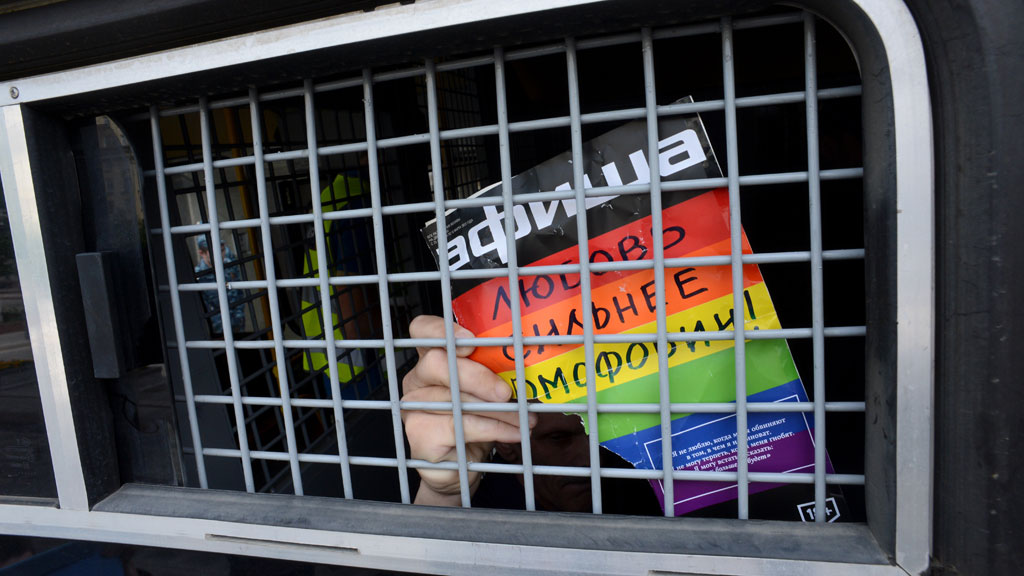Stephen Fry hits out at Russia’s anti-gay laws
From Stephen Fry to Barack Obama, global figures are turning up the heat on Russia over a new law which says gay people can be imprisoned for “looking gay” ahead of a sports event this weekend.

There’s been a growing furore over whether the controversial anti-gay law will impact the 2014 Winter Olympics, due to be held in Sochi next winter.
But there’s another major athletics event kicking off this very weekend which could turn the spotlight on how Russia treats its citizens – and its visitors – much sooner, as 2,000 athletes travel to Moscow for the World Athletics Championships.
At the same time, President Obama and Stephen Fry have formed an unlikely duo to criticise the law on different mediums and in different countries, but with the same message: the law, which could see visitors to Russia jailed for “looking gay”, is not acceptable.
Under the law against “gay propaganda” introduced in June, the Russian police have arrested Russians for holding hands, tweeting about gay relationships, carrying a rainbow flag and looking gay. Tourists accused of any of these activities face up to two weeks in prison and deportation by the Russian police.
Judgments ‘should be made on the track’
In an open letter, Stephen Fry pleaded with David Cameron to pay attention to the issue and even asked him to boycott the Olympics unless something changed.
He wrote: “I am gay. I am a Jew. My mother lost over a dozen of her family to Hitler’s anti-Semitism. Every time in Russia a gay teenager is forced into suicide, a lesbian ‘correctively’ raped, gay men and women beaten to death by neo-Nazi thugs while the Russian police stand idly by, the world is diminished and I for one, weep anew at seeing history repeat itself.”
His intervention followed US President Barack Obama, who spoke out against Russia’s anti-gay legislation on Tuesday on the Jay Leno show.
Mr Obama said that it was wrong and against the ethos of sporting events.
“Every judgment should be made on the track, or in the swimming pool, or on the balance beam, and people’s sexual orientation shouldn’t have anything to do with it,” he said.
The World Championships starts in Moscow on Friday and the Winter Olympics will be held in Russia in February.
No discriminatory treatment
The athletics governing body the IAAF has said it is confident that gay athletes competing in the premier track and field event this weekend will not face “discriminatory treatment” as a result of their sexual orientation.
Mr Nick Davies, the IAAF Deputy General Secretary said: “This legislation exists, and it is therefore essentially a political issue in this country. The IAAF cannot control or modify this…We have to respect the laws of the land we happen to have our world championships in.”
Speaking to Channel 4 News, IAAF spokesperson Yannis Nikolaou would not be drawn on whether the IAAF was asking gay athletes to pretend to be straight, or how the IAAF would protect athletes or officials if they were charged under Russian law.
“We are trying to keep politics outside of it. I haven’t heard people talking about this in relation to the world championships. We are trying to stay out of this,” he said.
‘Not responsible for spectators’
And the IAAF guarantee doesn’t extend to spectators.
“We are not responsible for spectators. This has nothing to do with us. This is just speculation, we cannot start commenting on it,” Mr Nikolaou told Channel 4 News.
British Athletics said: “We are taking the appropriate actions to protect all members of the GB and NI team, by following the UK government’s advice when travelling to specific countries.
“However, whilst the GB and NI team are in Moscow our focus will very much be on performances.”
Vigilante violence
International pressure has mounted on Russia following its ban on “gay propaganda” introduced in June. Images of police beating and arresting members of a gay pride protests and a string of arrests for minor offences.
A series of vigilante crimes against gay people have also received little attention from authorities. In one case where a young man died after he was tortured and raped after replying to a dating ad on a gay site, pictures of the attack and assailants were posted online, but activists suggested that no action had been taken by the police.